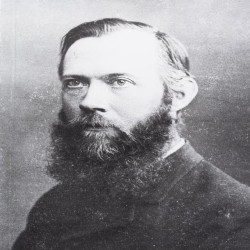
Antonie Pannekoek
Dutch astronomer
| Date of Birth | : | 02 January, 1873 |
| Date of Death | : | 28 April, 1960 (Aged 87) |
| Place of Birth | : | Vaassen, Netherlands |
| Profession | : | Dutch Astronomer |
| Nationality | : | Dutch |
Antonie Pannekoek (অ্যান্টনি প্যানেকোয়েক) was a Dutch astronomer, historian, philosopher, Marxist theorist, and socialist revolutionary. He was one of the main theorists of council communism.
Biography
Anton Pannekoek was a Dutch astronomer and Marxist theorist who made significant contributions to both fields. He studied mathematics and physics at Leiden University from 1891, but his passion for astronomy developed even earlier, as he observed the Milky Way and the variability of Polaris. While still a student, he published his first paper, On the Necessity of Further Researches on the Milky Way. After a brief stint as a geodesist, he returned to Leiden Observatory, where he worked as an observer and completed his thesis on the variability of Algol.
Pannekoek's interest in socialism was sparked after reading Equality by Edward Bellamy, which led him to study the works of Karl Marx and Joseph Dietzgen. He soon became a prominent Marxist writer, contributing to socialist magazines such as Die Neue Zeit. However, his activism clashed with his academic career when he was dismissed from his observatory position for supporting a strike. Frustrated with the outdated methods at Leiden Observatory, he accepted a teaching position at a school funded by the Social Democratic Party of Germany. His radical views soon drew government scrutiny, and he was threatened with expulsion if he continued teaching.
After moving to Bremen in 1910, Pannekoek became a leading figure of the radical Bremen Left. When World War I broke out, he was on holiday in the Netherlands and was unable to return to Germany. He then took up a position as a science teacher for secondary schools and a lecturer in the history of astronomy at Leiden University. In 1918, Willem de Sitter sought to appoint him as assistant director of Leiden Observatory, but the Dutch government blocked the appointment due to Pannekoek’s Marxist sympathies.
Instead, in 1918, the Amsterdam city council appointed him as a lecturer at the University of Amsterdam. He went on to establish the university's astronomical institute in 1921, became an extraordinary professor in 1925, and was promoted to full professor in 1932. Throughout his career, Pannekoek remained dedicated to both astronomy and revolutionary socialist thought, leaving a lasting impact on both fields.
Quotes
Total 0 Quotes
Quotes not found.